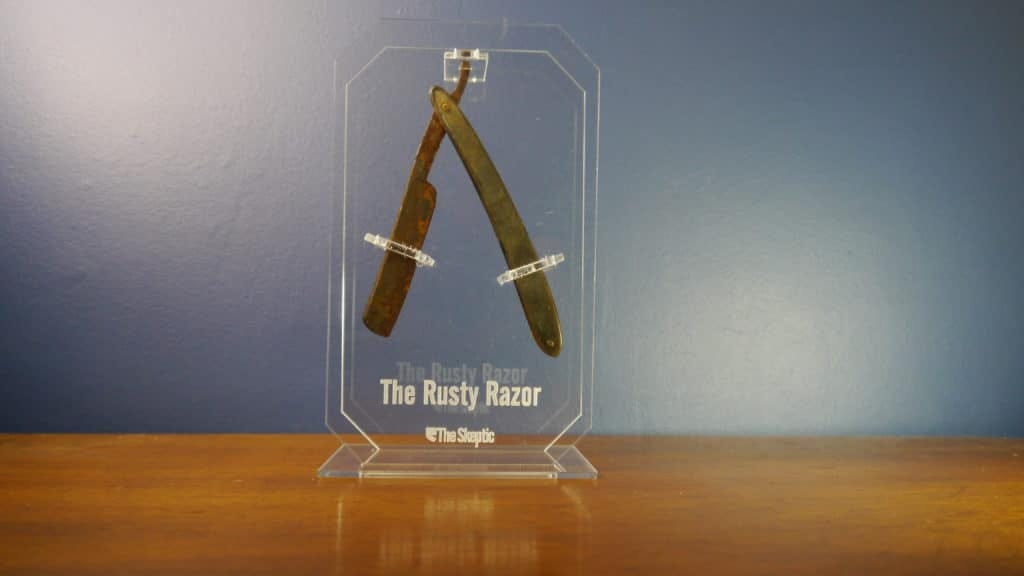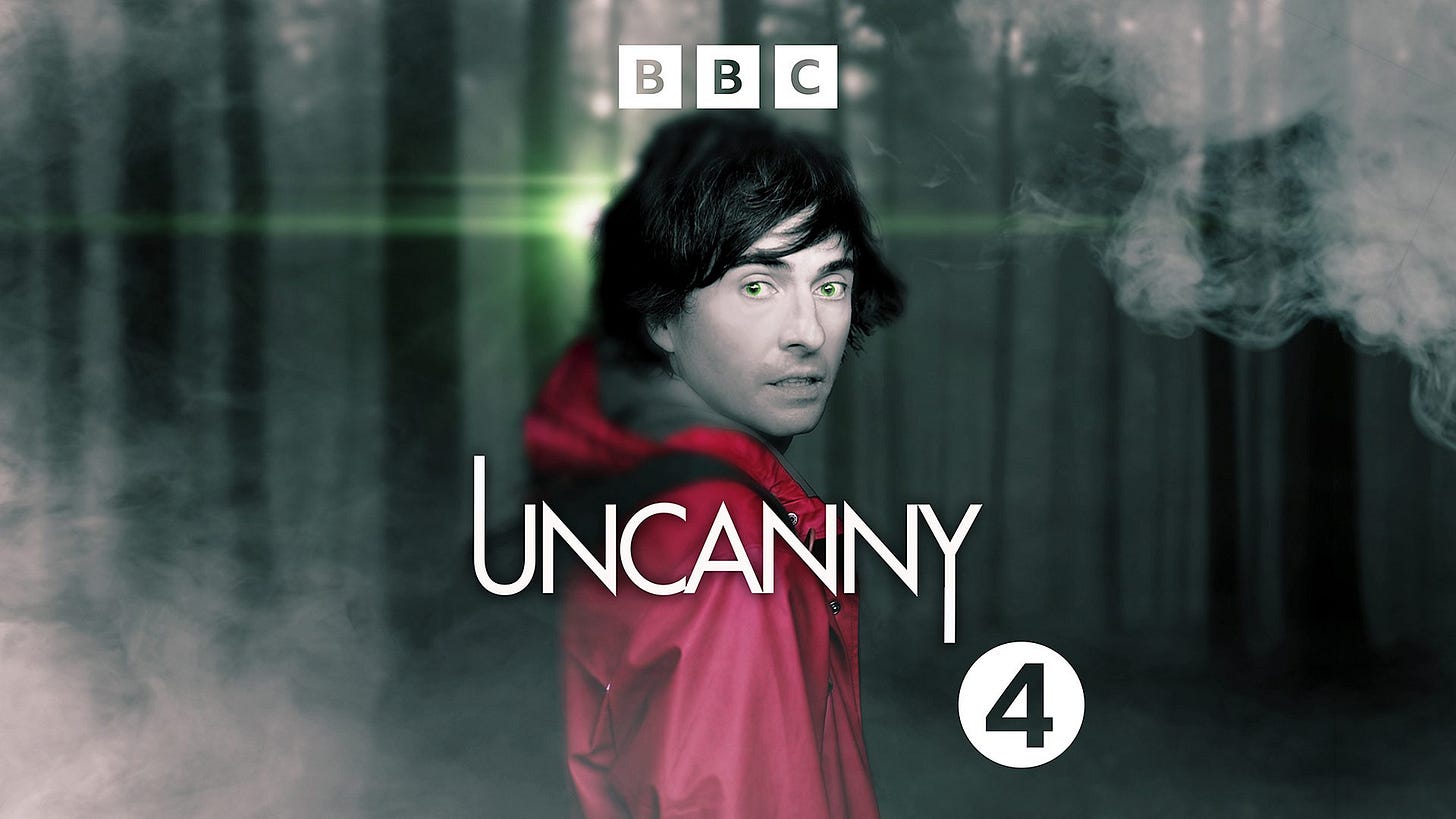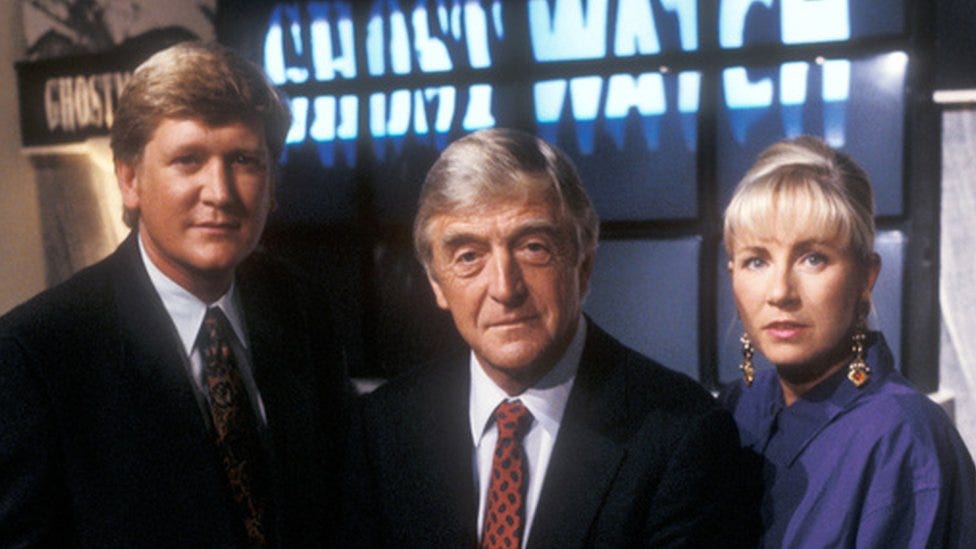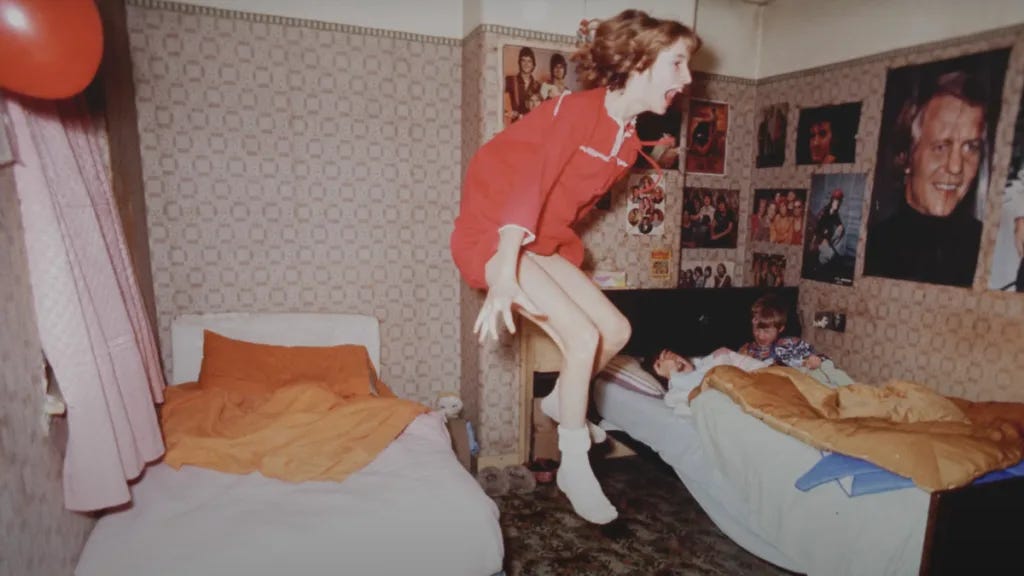The Uncanny Aesthetic of Ghost Hunting
Why Danny Robins’ ghost show almost won a Rusty Razor Award for pseudoscience
Earlier this year in Manchester, The Skeptic magazine hosted The Ockham’s Award ceremony at QED 2025. Dr Cyriac Abby Philips, a doctor and expert on the harms caused by alternative medicine in India, was named the 2025 recipient of the Ockham Award for Skeptical Activism.
Then came the Rusty Razor Award - presented to the person, group, or organisation deemed the year’s most prolific promoter of pseudoscience or unscientific ideas. The Rusty Razor shortlist raised a few eyebrows because among the usual suspects of pseudoscientific health claims and conspiracy nonsense, there it was: Danny Robins, creator and host of the BBC’s Uncanny podcast, live tour, book, and television series.
For some, it was a surprise. A BBC paranormal series? On a list with conspiracy theorists and far-right charlatans?
For others - like me - it felt long overdue.
Because although Uncanny markets itself as an investigation into people’s real-life ghost stories, when you peel back the sound design, the serious tone, and the air of legitimacy, it’s doing what paranormal shows have always done: telling spooky stories in a way that prioritises drama over truth, and as a serious researcher of people’s paranormal claims, it feels like an injustice to the profound experiences that people report.
Are you team believer or team skeptic?
That’s the tagline Uncanny leans on.
It’s clever, marketable, but ultimately misleading. That binary framing flattens complex cases into a cartoonish tug-of-war. You’re either on the side of belief, or you’re the joyless party pooper. There’s no space for nuance, for saying “I don’t know,” or for asking “what else could explain this?”
As I wrote in a previous piece for The Skeptic, when it comes to science and public discourse, the standard must be truth and accuracy, not false balance. Presenting paranormal claims and skeptical analysis as equal viewpoints - no matter the strength of the evidence - isn’t balance. It’s just bad methodology dressed up as fairness.
And once you start rewarding that framing with attention, airtime, and funding, it becomes hard to break the cycle. And I say this as someone who’s seen it from the inside.
I contributed to Season One of Uncanny, offering skeptical insight and alternative explanations for the stories being told. I believed there was value in a show that took experiences seriously but didn’t jump to conclusions. That believed in ghosts as stories we can learn from, not face-value facts… but it didn’t take long to see where the compass was really pointing.
My well-researched, rational takes were routinely treated as equivalent to claims based on anecdote, misinformation, or personal opinion stated as fact. In live events, it became clear I wasn’t there for what I had to say - I was there to wear the label “Skeptic,” to serve as the foil. I was there to make the ghost stories feel more compelling by contrast.
Once that realisation set in, I stepped away from future seasons, because treating skepticism as a gimmick - a theatrical role rather than a methodology - lends credibility to ideas that haven’t earned it. And even if a paranormal podcast isn’t about to start shaping public policy, beliefs ripple. Research consistently shows that people with strong paranormal beliefs are more susceptible to other forms of pseudoscience, from conspiracy theories to alternative health scams.
I didn’t want to be part of that ripple. And I still don’t.
“The biggest investigation into the paranormal - ever”
Robins introduces Uncanny as a platform sharing the “real life stories of the supernatural told by the people they happened to” while also claiming the show (and all that has followed it since its launch on BBC Radio 4,) is “the biggest investigation into the paranormal - ever.”
This is a claim that does not hold up. People have been involved in the research of paranormal phenomena for centuries. For example, just here in the UK, the Society for Psychical Research (SPR) was founded in 1882 as the first organisation to conduct scholarly research into human experiences that challenge contemporary scientific models. Similarly, the Association for the Scientific Study of Anomalous Phenomena (ASSAP) was founded in in 1981 to investigate, research and educate on a wide range of anomalous phenomena. Both continue to operate to this day with healthy memberships.
Ironically, one of the Society for Psychical Research’s (SPR) most famous cases - the Enfield Poltergeist - may have done more to shape contemporary ghost hunting media than any single television producer ever has. Steven Volk, the BAFTA-winning writer behind the infamous 1992 BBC broadcast Ghostwatch, has frequently cited the Enfield case as a direct influence on the show’s concept. Ghostwatch presented a faux live investigation from a suburban family home tormented by a poltergeist named “Pipes,” blending fictional horror with documentary-style realism.
Years later, Most Haunted would launch on Living TV. Presented by Yvette Fielding, the show adopted a suspiciously similar format - a roaming team, on-site vigils, night-vision cameras, and whispered tension in every shadow. Sometimes even broadcast live! Other shows followed suit, borrowing tropes and methods from Most Haunted while claiming to bringing something new to the table.
Take the US show Ghost Hunters, for example. When it debuted in 2004, it was pitched as a more “serious” response to Most Haunted - a scientific alternative to the shrieking, shaky-cam chaos of UK ghost TV.
And yet, Ghost Hunters popularised the use of “ghost hunting tech” with no real scientific merit: EMF meters, thermal cameras, laser grids, digital recorders, motion sensors. Devices that looked scientific but were never designed for detecting ghosts. There was no hypothesis-testing, no controls, no willingness to be proven wrong. Just gear and vibes.
It wasn’t science. It was science cosplay.
And that cosplay has become embedded in today’s ghost hunting culture. The same gear is now used by amateur ghost hunters up and down the country - presented as proof of a rational, tech-based approach, when in fact it’s nothing of the sort.
In that sense, you can start to see how paranormal media is a full circle: real-life paranormal research (Enfield) inspired fictional media (Ghostwatch), which in turn shaped modern paranormal media (Most Haunted et al.), which itself shapes the culture of contemporary ghost hunting.
So when Uncanny brands itself as “the biggest investigation into the paranormal,” it betrays a lack of awareness - or worse, a rewriting - of the foundations on which its popularity stands: the work of actual paranormal researchers, however flawed, who came before.
The Ghost Economy
At this year’s Rusty Razor ceremony, Skeptic editor Michael Marshall summed it up perfectly:
“We’re seeing ghost hunting groups springing back up around the country, bothering old pubs and stately homes for the right to host sleepovers in the name of science. As well as the BBC commissioning copycat shows featuring comedians doing the same sort of thing. Genuinely, somewhere Yvette Fielding is dusting off her night-vision camera and saying a silent prayer of thanks to Danny Robins.”
It’s funny because it’s true.
For all its polish and prestige, Uncanny isn’t new. It’s just the next iteration of a ghost hunting media format that’s been around for decades, and this matters because these shows don’t exist in a vacuum.
Episodes of Uncanny (and its many cousins) lead to real-world tourism. People travel to the locations featured in these stories, eager to experience the strange for themselves. Commercial ghost hunt tickets get sold, sleepovers get booked, haunted hotels jack up their prices.
And every new story, every new “encounter” adds to the legend. People report feelings and sensations that match the lore, and those stories get folded back into the mythos. What started as one fuzzy anecdote becomes a patchwork of belief, reinforced not by evidence but by repetition.
This isn’t investigation. It’s a feedback loop that dilutes the truth before it can be properly investigated.
Ghost hunting shows - even the shiny new ones - aren’t built for that. They’re built for suspense. For cliffhangers. For “we may never know.” They tell the stories that people share at face value and offer very little else by way of helping people to understand what happened to them, other than to offer lip service to Team Skeptic (boo, hiss…)
That may be good entertainment, but it isn’t good epistemology.
Ghost stories are a rich part of human culture. They help us talk about grief, fear, memory, identity. They have real emotional power, and I’ll always defend their value as folklore.
But when we start calling them investigations, and presenting the format as balanced inquiry, we mislead people. We train audiences to confuse storytelling with evidence. To think skepticism is just a personality trait, not a method. To believe that having a gadget in your hand makes you a scientist.
I’ve been investigating paranormal reports for decades. To properly investigate anything, you need more than a flashlight and a vibe. You need patience, critical thinking skills, and a lot of humility. You need to consider alternative explanations (not just reinforce the ones that sound spookiest), listen to eye-witnesses (not just share their stories), and above all, you need to be okay with being wrong. Because that’s how real inquiry works.
And whenever we veer away from this, that has consequences - not just for how we think about ghosts, but for how we think about truth.
If we want to do better - if we want to make room for real mystery, and real inquiry - we need to stop pretending anything presented by paranormal media is science, and start treating it for what it is: performance with a paranormal script.
And if we want to be honest with ourselves?
We already know how it ends.







Great to see you writing here again Hayley, and I'm glad you've tackled Uncanny head-on like this. I wondered if there was a reason for you not being involved beyond that first season, so it's reassuring to know you had similar misgivings to those of many of us listening. The repeated insistence that "if you're a skeptic then you need to provide a logical explanation for (insert phenomenon here)," drove me to stop listening to Robins and his output a year or two back out of sheer frustration. In some ways I guess it reflects the entire BBC practice of false equivalence, and it's troubling that this kind of paranormal programming is making such a resurgence in a time when even the basic tenets of objective reality are frequently rejected in the media.